Ithomisa kinkelini
|
|
Updated as per Lemaire's Hemileucinae 2002, February, 2008
Updated as per personal communication with Philippe Brems (Rio Grande do Sul, Brazil); May 12, 2011
|
Ithomisa kinkelini
Oberthur, 1881
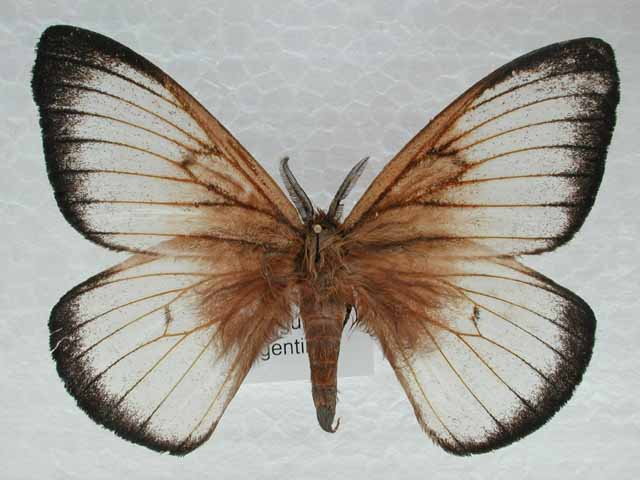
Ithomisa kinkelini (male), Argentina, courtesy of
Eric van Schayck.
TAXONOMY:
Superfamily: Bombycoidea, Latreille, 1802
Family: Saturniidae, Boisduval, [1837] 1834
Subfamily: Hemileucinae, Grote & Robinson, 1866
Tribe: Hemileucinae, Grote & Robinson, 1866
Genus: Ithomisa, Oberthür, 1881
|
MIDI MUSIC
"Someone to Watch
Over Me"
copyright C. Odenkirk
MIDI CITY
ON.OFF
<bgsound src="watch.mid" LOOP=FOREVER>
|
DISTRIBUTION: The day-flying (males) Ithomisa kinkelini moth
(wingspan: males: 84-106mm; females: 103-106mm) flies in
Argentina: Buenos Aires and possibly
Entre Rios, Corrientes and Misiones, and in
Brazil: Parana, and possibly further to the north, and in Rio Grande do Sul (PB) and probably Santa Catarina.
The basal area is reddish brown, while the median and postmedian areas are
white, and the outer margins are dark brown. Ithomisa kinkelini
courtesy of Pablo Wagner, Argentina. |
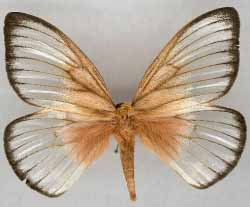 |
FLIGHT TIMES AND PREFERRED FOOD PLANTS: Moths are on the wing
in February and perhaps in other months. Ithomisa
larvae eat Paepalanthus polyanthus and
Eryngium penicillatum.
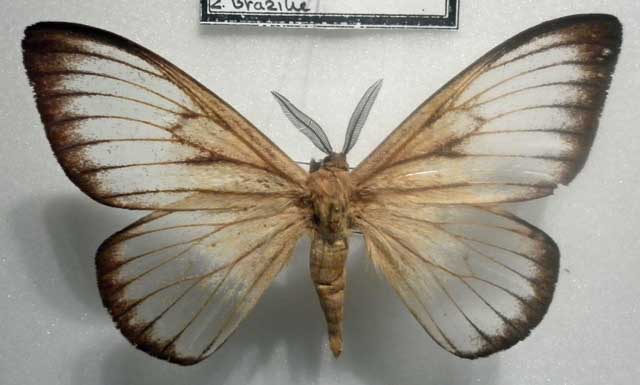
Ithomisa kinkelini male, Rio Grande do Sul, Brazil,
questionable location data, courtesy of Philippe Brems.
ECLOSION, SCENTING AND MATING:
Day-flying (9:00 am - 5:00 pm) males use well-developed antennae
to seek out females which scent
during the day but fly at night.
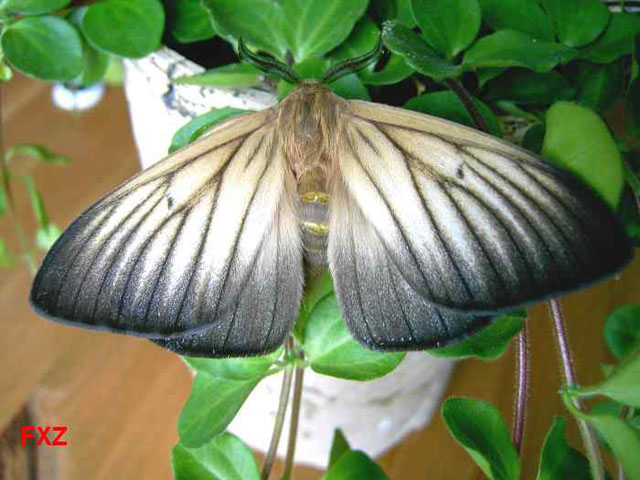
Ithomisa kinkelini male, Argentina, courtesy of
Franz Ziereis
copyright.
Regarding the above moth, it is a better match
for Lemaire's picture and description of I. catherina
(described from the states of Minais Gerais, Parana and
Santa Catarina in Brazil, but not from Argentina)
than it is for I. kinkelini,
(described from Parana, Brazil; and Buenos Aires, Argentina).
I looked at Lemaire's drawings of the genitalia
and see (no expertise on my part)
only minor differences and believe the two "species" may
actually be variations of the same species.
Subsequently Franz was able to send me an image of a worn specimen.
Scales are apparently lost very easily, revealing a good match for
I. kinkelini.
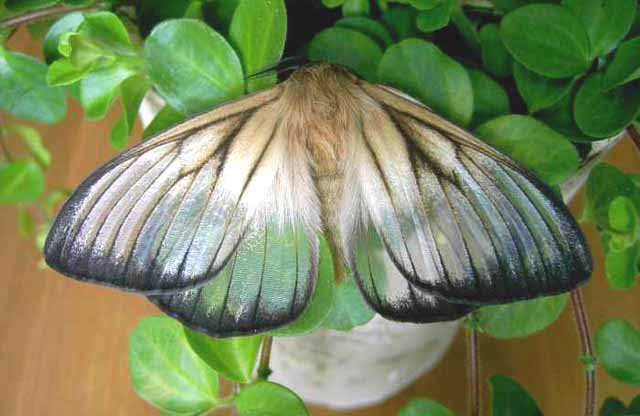
Ithomisa kinkelini worn male, Argentina, courtesy of
Franz Ziereis
copyright.
EGGS, LARVAE, COCOONS AND PUPAE:
Females deposit oval,
white eggs with a greenish tinge on host plant foliage.
Larvae may be either green with black intersegmental spaces or
black with green intersegmental spaces. In both cases they are
equipped with
short pink scoli and spines.
Typical of
species in the Genus Ithomisa and the
Subfamily Hemileucinae, the larvae are armed with urticating
spines. |
|
Larval Food Plants
It is hoped that this alphabetical listing followed by the common name of the foodplant will
prove useful. The list is not exhaustive. Experimenting with closely related foodplants is worthwhile.
Paepalanthus polyanthus......
|
Paepalanthus polyanthus
|
Use your browser "Back" button to return to the previous page.
Return to Ithomisa Genus
Return to South American Saturniidae Direcotry
Return to Main WLSS Index





